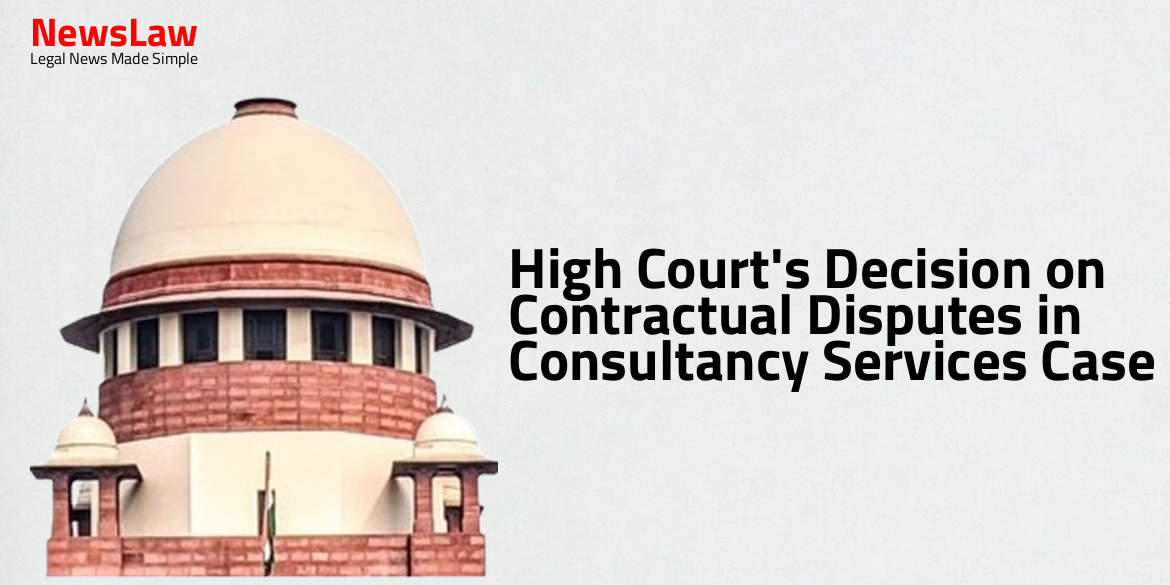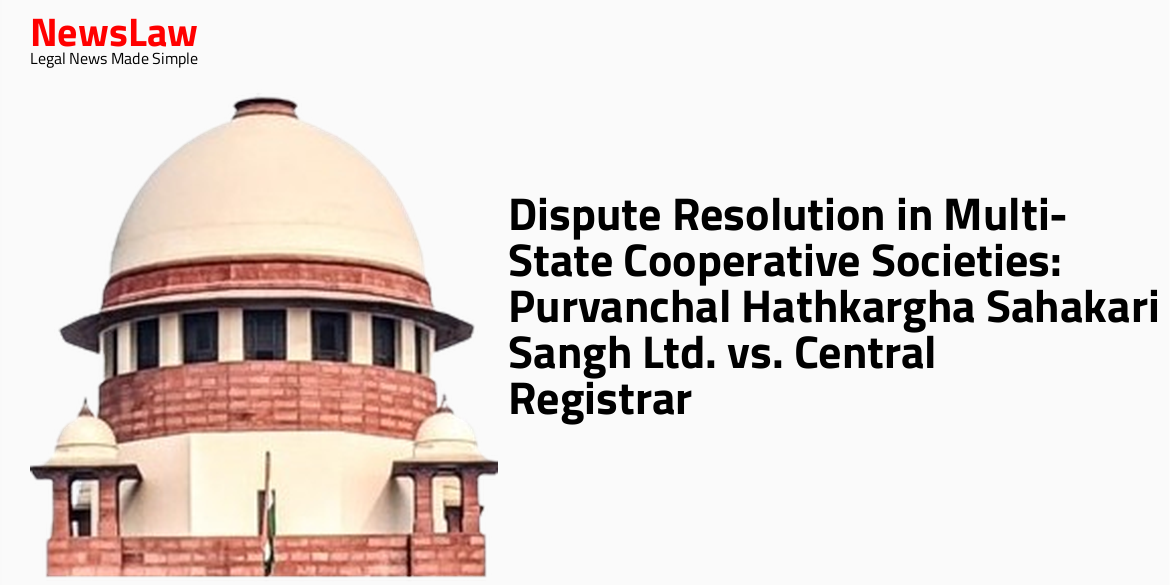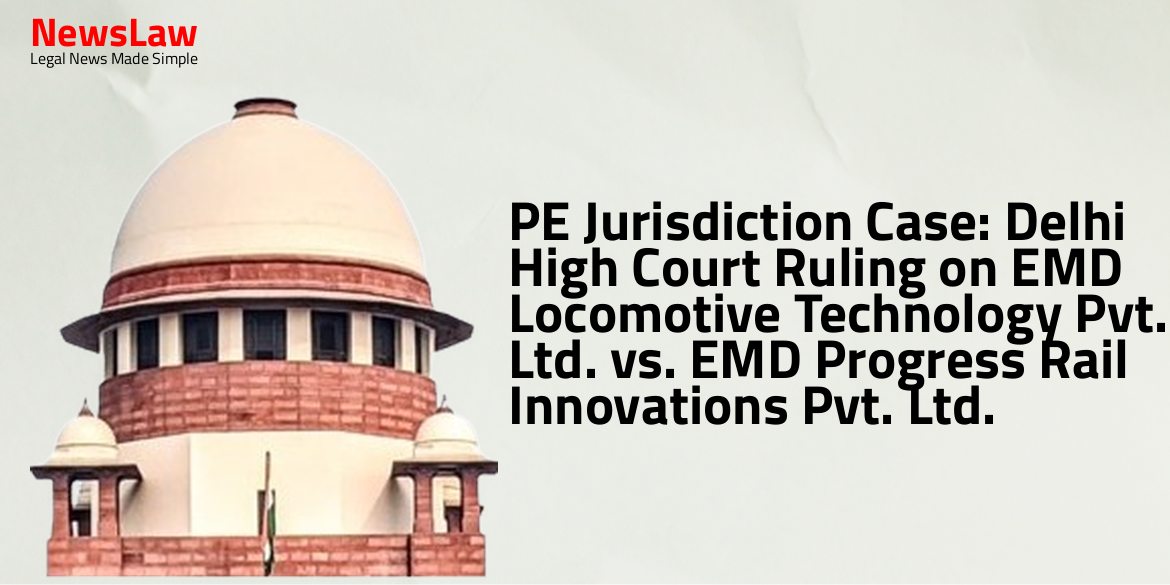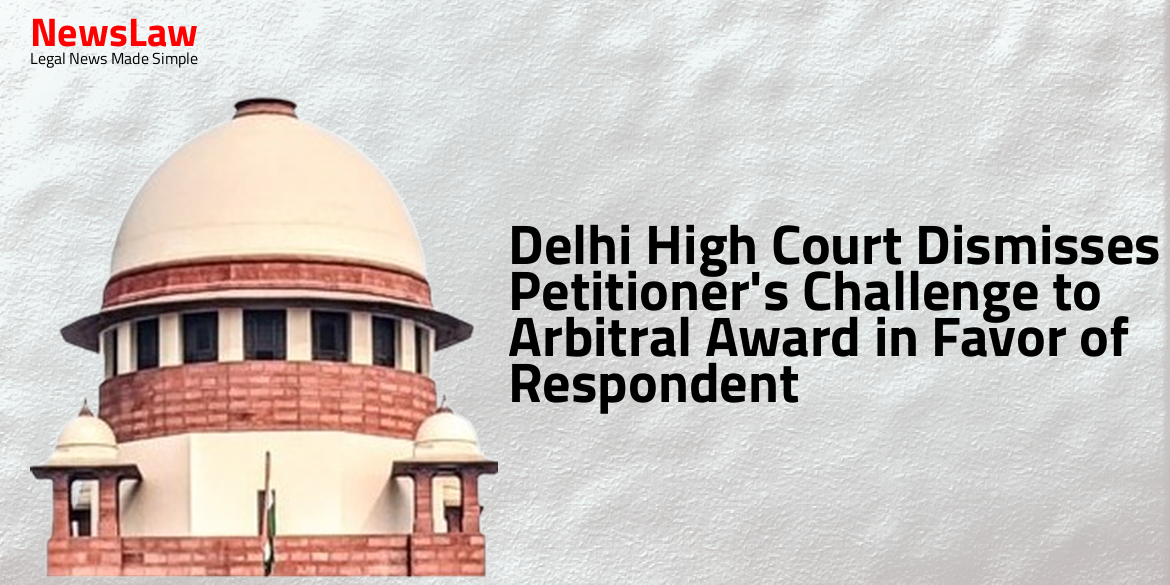In a recent ruling by the Delhi High Court, a decision was made regarding contractual disputes in a case involving consultancy services. The Court’s judgment sheds light on the intricacies of the dispute between the parties and sets a precedent for similar cases in the future. Let’s delve into the details of this crucial legal development.
Facts
- The contracts were for consultancy services provided by the petitioner for various married accommodation projects.
- Disputes were referred to arbitration due to disagreements on claims related to project cost enhancements.
- The claims involved variation in service tax, GST, and interest on the awarded amounts.
- The contracts and contentions of the parties were similar across all three cases.
- The learned Arbitrator rejected all of the petitioner’s claims.
- The claims were categorized into escalation claim, risk and cost contracts, and consultancy charges.
- The claim amounts varied based on project cost enhancements, DEPMC fees, and additional fees for extended periods.
- Pune and Ahmednagar cases involved termination of original contracts and entering into risk and cost contracts with new contractors.
- Miscellaneous claims were specific to the Vizag case only.
- Pendente lite interest was sought till the date of the award.
- The petitioner’s claims fell under three main categories: 1. Compensation for project cost enhancements, 2. Prolongation of the contract, and 3. Enhanced compensation based on risk and cost contracts.
- The contracts required the Consultant to provide services from pre-construction to post-construction stages.
- Payment of consultancy charges was staged during different project phases.
- Bids for detailed engineering consultant services were invited on 12.02.2009, with the petitioner being awarded the contracts on 22.05.2009.
- Petitioner challenged three arbitral awards dated 17.08.2023 under Section 34 of the Arbitration and Conciliation Act, 1996.
Arguments
- The petitioner claimed reimbursement for increased costs during the execution phase of the Contract, which it was responsible for managing and supervising.
- The consultancy charges were argued to be based on the enhanced project cost according to Clause 1.10 of the Contract.
- The arbitrator’s jurisdiction to assess evidence and determine reimbursement claims was upheld.
- The claims arising from enhancement in the project cost were distinguished from claims based on prolongation of the Contract.
- The argument that the delay was not attributable to the petitioner was raised in defense of the claims.
- The contractual clauses and Article 16 of the Contract were used to support the petitioner’s position.
- Claims for services rendered during the defect liability period were also highlighted.
- The arbitrator’s interpretation of certain clauses as a bar to additional compensation for project delays was contested by the petitioner.
- Evidence such as rise in Consumer Price Index was presented to support claims of enhanced employee remuneration during contract prolongation.
- The distinction between claims arising from project cost enhancement and contract prolongation was emphasized as crucial.
- Misconceptions in the arbitration award regarding the nature of the claims and relevant contractual provisions were highlighted.
- The petitioner’s entitlement to additional compensation based on project cost enhancement was deemed unresolved in the award.
- Petitioner claimed delay in terminating contractor’s engagement due to progress issues.
- Arbitrator found that petitioner, an experienced consultant, accepted a fixed fee despite awareness of project delays.
- Petitioner’s evidence of supervising work and recommending termination of contractor’s agreement was not supported by documentary evidence.
- Arbitrator rejected claims of fee enhancement due to lack of proof and reliance on CPI rise.
- Delay in project completion attributed to contractor, not respondent, as per Arbitrator.
- Claims for providing services beyond Defects Liability Period based on CPI index, without clear evidence.
- Arbitrator did not fully adjudicate post-award documents related to salary claims for staff.
Analysis
- The onus of proving the quantum of damages was upon the petitioner.
- The petitioner chose not to lead any evidence other than the CPI.
- The claimant did not provide any bills to prove the amounts allegedly deducted.
- A party in possession of the best evidence must produce it in court, failing which an adverse inference is drawn.
- The claims for damages for prolongation of the contract were not supported by sufficient evidence and were rejected.
- The nature of the contracts must be considered before adjudicating factual disputes.
- No evidence was presented to prove the claimed variation in Service Tax.
- The service tax clause in the contract specified that any new or additional tax was payable by the claimant.
- The court should defer to the Arbitrator’s interpretation of contractual terms unless found irrational or perverse.
- The burden of proof is on the party making a factual averment.
- Presumption of adverse inference for non-production of evidence is always optional and context-dependent.
- The Court cannot interfere with arbitrator’s interpretation of the contract unless perverse.
- The claimant did not demonstrate an increase in service tax or provide any proof of payment to the GST Department.
- Claims based on rise in CPI alone were insufficient to prove prolongation costs.
- The consultant’s responsibilities during the construction phase were clearly outlined in the contract.
- The Arbitrator’s findings on sufficiency of evidence regarding claimed damages were upheld.
- Adverse inference is permissible when larger evidence points to the contrary.
- The approach taken by the Arbitrator was not contrary to established principles.
- The Scope of Work provisions in the Contract were relevant to the analysis.
- The clauses regarding risk and cost contracts were specifically discussed and supported by the Contract terms.
- Allegations of delay attributable to the respondent were rejected based on the evidence presented.
- Responsibility of consultant team in case of contract cancellation by owner
- Joint inventory of assets to be conducted by consultant, Project Manager, and contractor
- Recognition of impracticality to provide for every contingency in the contract
- Agreement for fair operation of the contract without detriment to either party
- Commitment to resolve any unfairness in contract operation through mutual agreement
- Dispute resolution through arbitration in case of failure to agree on necessary actions
- The
- The learned Arbitrator conducted the exercise of interpreting contractual clauses, which was deemed within their domain.
- The petitioner failed to provide necessary bills to support claimed deductions and GST invoicing, hence their challenge was not accepted.
- The absence of evidence from the respondent did not prevent the Arbitrator from concluding that the claims were proven.
- Interpretative guidance from Article 16 was suggested as a factor in the decision-making process.
- Benefit of doubt was not automatically given to the petitioner, as the Arbitrator had the jurisdiction to make their own determinations.
- In the case of Union of India v. Ibrahim Uddin, the law on adverse inference was summarized.
- The judgment of the Supreme Court in Asian Techs was favored over the judgment in Ramnath International Construction (P) Ltd. v. Union of India.
- In Simplex Concrete, an award of damages by an Arbitrator was upheld as contractual clauses preventing damages were deemed void due to conflict with Section 23 of the Indian Contract Act, 1872.
- In NHPC, a distinction was drawn between claims for damages and reimbursement of costs, with the former requiring evidence.
- Salwan Construction, a case of a non-speaking award under the Arbitration Act, 1940, highlighted the need for claims to be evidence-based rather than reliant on mathematical derivations or novel formulas.
Decision
- The petition O.M.P.(COMM) 526/2023 and O.M.P.(COMM) 527/2023 are dismissed.
- Costs will be as per the rates quoted in the financial proposal with nothing extra payable to the consultant.
- The petitioner’s contention regarding Claim Nos. 1, 2, and 3 in the Pune and Ahmednagar cases is rejected.
- All pending applications are disposed of.
- The impugned award is set aside for rejection of Claim Nos. 1, 2, and 3, allowing the petitioner to initiate fresh arbitration proceedings for these claims.
- Claim Nos. 4 and 7 in the Vizag case, and Claim No. 4 in the Pune and Ahmednagar cases are discussed in relation to the contractual clauses.
- O.M.P.(COMM) 518/2023 is partly allowed for the reasons provided.
- The consultant is directed to prepare tender documents and submit them for the Issue of risk and cost tender(s).
- Consultant to carry out tender evaluation and submit recommendations upon receipt of bids.
- The petitioner is granted the liberty to commence new arbitration proceedings for the mentioned claims.
Case Title: WADIA TECHNO ENGINEERING SERVICES LIMITED. Vs. DIRECTOR GENERAL OF MARRIED ACCOMMODATION PROJECT & ANR. (2024:DHC:4336)
Case Number: O.M.P. (COMM)-526/2023



